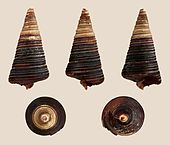Brackish water mud snails
| Brackish water mud snails | ||||||||||
|---|---|---|---|---|---|---|---|---|---|---|

|
||||||||||
| Systematics | ||||||||||
|
||||||||||
| Scientific name | ||||||||||
| Potamididae | ||||||||||
| H. Adams & A. Adams , 1854 |
The brackish water mud snails ( Potamididae ) are a family of marine snails comprising 29 recent species in six genera as well as numerous fossil taxa. In addition to various species from other families, such as the Batillariidae , Neritidae , Littorinidae , Ellobiidae and Amphibolidae , snails from this family are typical representatives of the snails that live in mangrove forests .
Taxonomy and systematics
Currently, the Potamididae are delimited based on a comprehensive systematic revision using molecular and morphological features and not further divided into subfamilies. In the traditional system, however, fossil taxa from the Batillariidae family were also assigned to the Potamididae.
Ecology and diffusion
Most species are closely associated with mangroves . The Potamididae are widespread in warm-temperate and tropical coastal areas of the Mediterranean , Pacific and Atlantic and are usually found in suitable habitats in high population densities. They inhabit the tidal range and live mainly on muddy or sandy substrates. Some species also climb mangrove trees.
Fossil evidence
The evolution of the Potamididae is closely related to the evolution of the mangrove . The first fossils that can be safely assigned to the Potamididae are the housings of Potamides from the Paleocene of Europe . From here, the group has likely spread along the Tethys coasts along with the advance of mangroves . The modern members of the family , such as Terebralia , Cerithideopsis , appeared in the Middle Eocene along with the first mangroves. It is believed that the Potamididae subsequently became extinct in the Mediterranean after the closure of the Tethys . In the Pliocene to Pleistocene , the Mediterranean from the Indo-West Pacific was colonized again by ancestors of the species Cerithideopsilla conica that occurs there today . This colonization was made possible by the presence of a planktotrophic Veliger larva in this group.
Genera


Six recent and a number of fossil genera are currently considered valid:
Recent genera:
- Cerithidea Swainson, 1840
- Cerithideopsis Thiele, 1929
- Pirenella Gray, 1847 ( Syn . : Cerithideopsilla Thiele, 1929)
- Telescopium Montfort, 1810
- Terebralia Swainson, 1840
- Tympanotonos Schumacher, 1817
Fossil genera:
- † Bittiscala Finlay & Marwick, 1937
- † Canaliscala Cossmann, 1888
- † Exechestoma Cossmann, 1899
- † Gantechinobathra Kowalke, 2001
- † Harrisianella Olson, 1929
- † Potamides Brongniart, 1810 (type genus of the family)
- † Vicarya Vicarya d'Archiac & Haimes, 1854
- † Vicaryella Yabe & Hatai, 1938
Note: The assignment of fossil groups within the cerithioidea is problematic as it is based exclusively on (mostly incompletely preserved) shells. Some groups that were previously assigned to the Potamididae are now assigned to the Batillariidae .
Individual evidence
- ↑ a b c d e f g h i D. G. Reid, P. Dyal, P. Lozouet, M. Glaubrecht, ST Williams: Mudwhelks and mangroves: The evolutionary history of an ecological association (Gastropoda: Potamididae) . In: Molecular Phylogenetics and Evolution . tape 47 , no. 2 , April 2008, p. 680-699 , doi : 10.1016 / j.ympev.2008.01.003 , PMID 18359643 .
- ^ Philippe Bouchet, Jean-Pierre Rocroi, J. Frýda, B. Hausdorf, W. Ponder, Á. Valdés, A. Warén: Classification and Nomenclator of Gastropod Families . In: Malacologia . tape 47 , 2005, p. 1-397 .
- ↑ David G. Reid & Tomo Ozawa: The genus Pirenella Gray, 1847 (= Cerithideopsilla Thiele, 1929) (Gastropoda: Potamididae) in the Indo-West Pacific region and Mediterranean Sea. Zootaxa, 4076.1, February 2016 doi : 10.11646 / zootaxa.4076.1
